The Future is Now: How Can You Benefit From Marketing AI
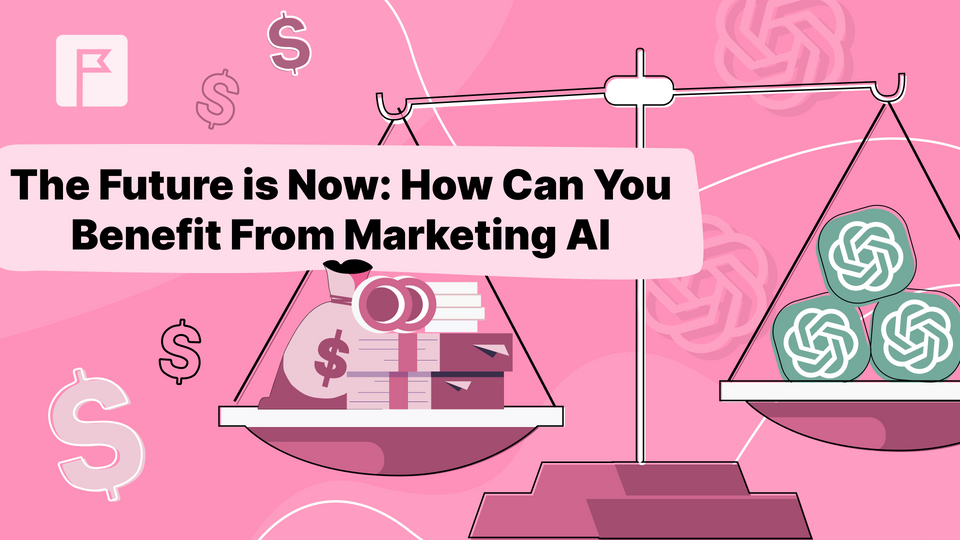
If you still count yourself among those who don't understand modern technology and are afraid that AI will take away their jobs, then this article is for you. To become more educated on the topic, read the first article in our series “The Future is Now” about the basics of marketing AI. Part one will cover the basics of marketing AI, giving you a fundamental understanding of the changes that AI has brought to our field, as well as the key pros, cons, and future prospects of this technology.
Now, let’s help you cope with the panic of potentially losing out to modern technology in professional competencies. Learn this important idea: “Artificial intelligence will not take your job, but your job will be taken by someone who has learned how to use artificial intelligence effectively”. That's why we have prepared a more practical guide that will give you a real understanding of how you can use AI in your work for specific tasks. Grab a pad and pen and write down a plan to take over the digital marketing world using the most advanced AI solutions!
The nature of marketing AI
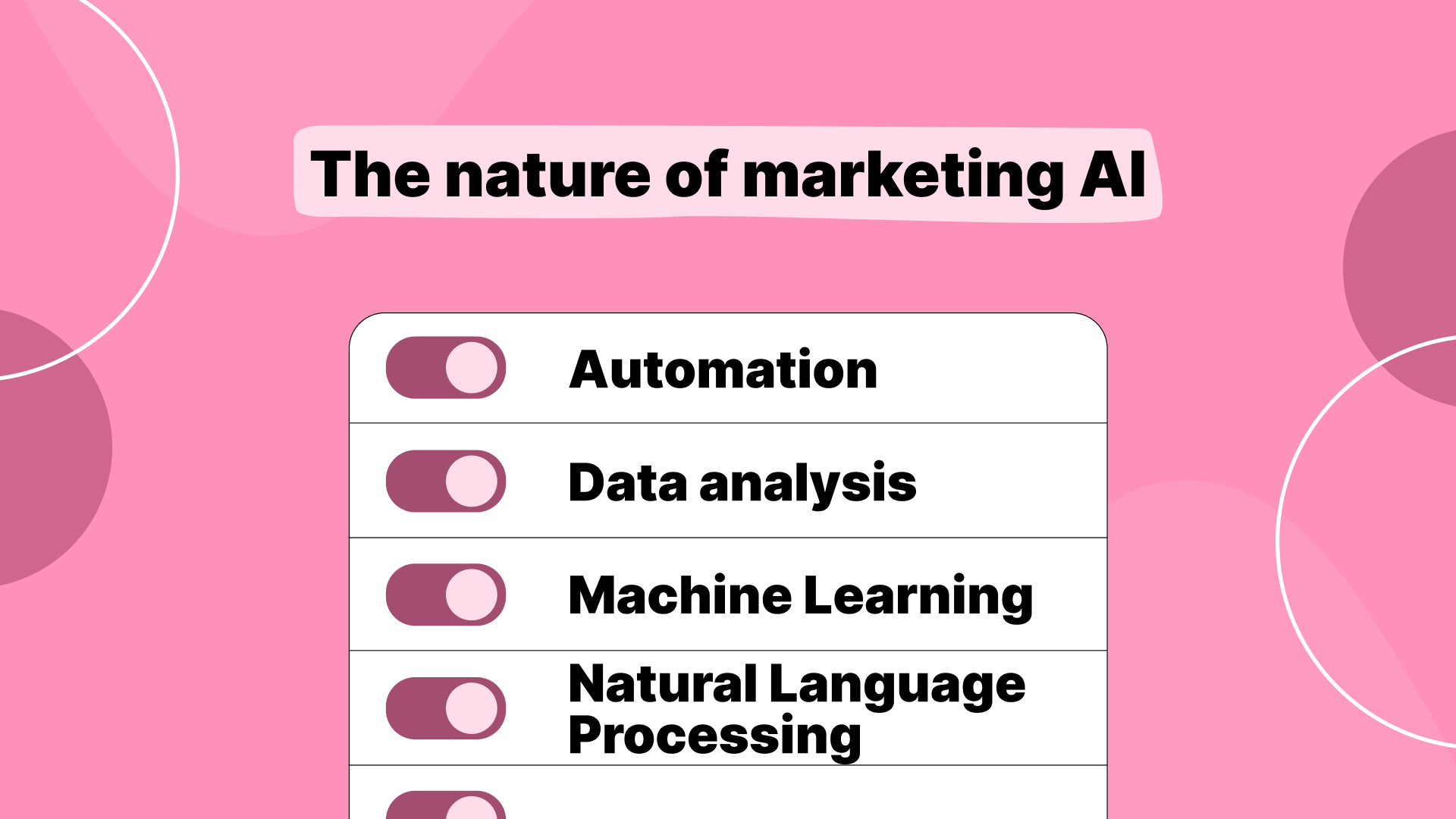
AI marketing is a practice that takes advantage of artificial intelligence capabilities to make automated decisions based on data collection, data analysis, and additional information about audience or industry trends that might affect marketing efforts. Here are some key features of AI marketing:
- Data analysis
AI systems can process extensive amounts of marketing data at extraordinary speeds, much faster and more accurately than average human analytics. This makes it possible to gain deeper insights into customer behaviour, preferences, and trends.
- Machine Learning (ML)
This technology involves algorithms that learn from data to improve their accuracy over time without being manually programmed. It’s like a baby that learns from its mistakes and the pieces of advice of more experienced individuals. In marketing, ML is used for predicting customer behavior, segmenting audiences, and personalizing communications.
- Natural Language Processing (NLP)
AI uses NLP to understand and generate human language in a way that is valuable for engaging with customers. This can be seen in chatbots and AI-driven content creation tools. We don't want to lose loyal customers because they received cold robotic dialogue instead of an empathetic polite call centre operator, do we?
- Automation
Many of the repetitive tasks in marketing, such as sending follow-up emails or managing social media posts, can be automated with AI. This not only increases efficiency but also frees up human marketers to focus on more strategic activities. Delegating routine tasks to a machine can also save the cost of line staff.
How can you benefit from it?
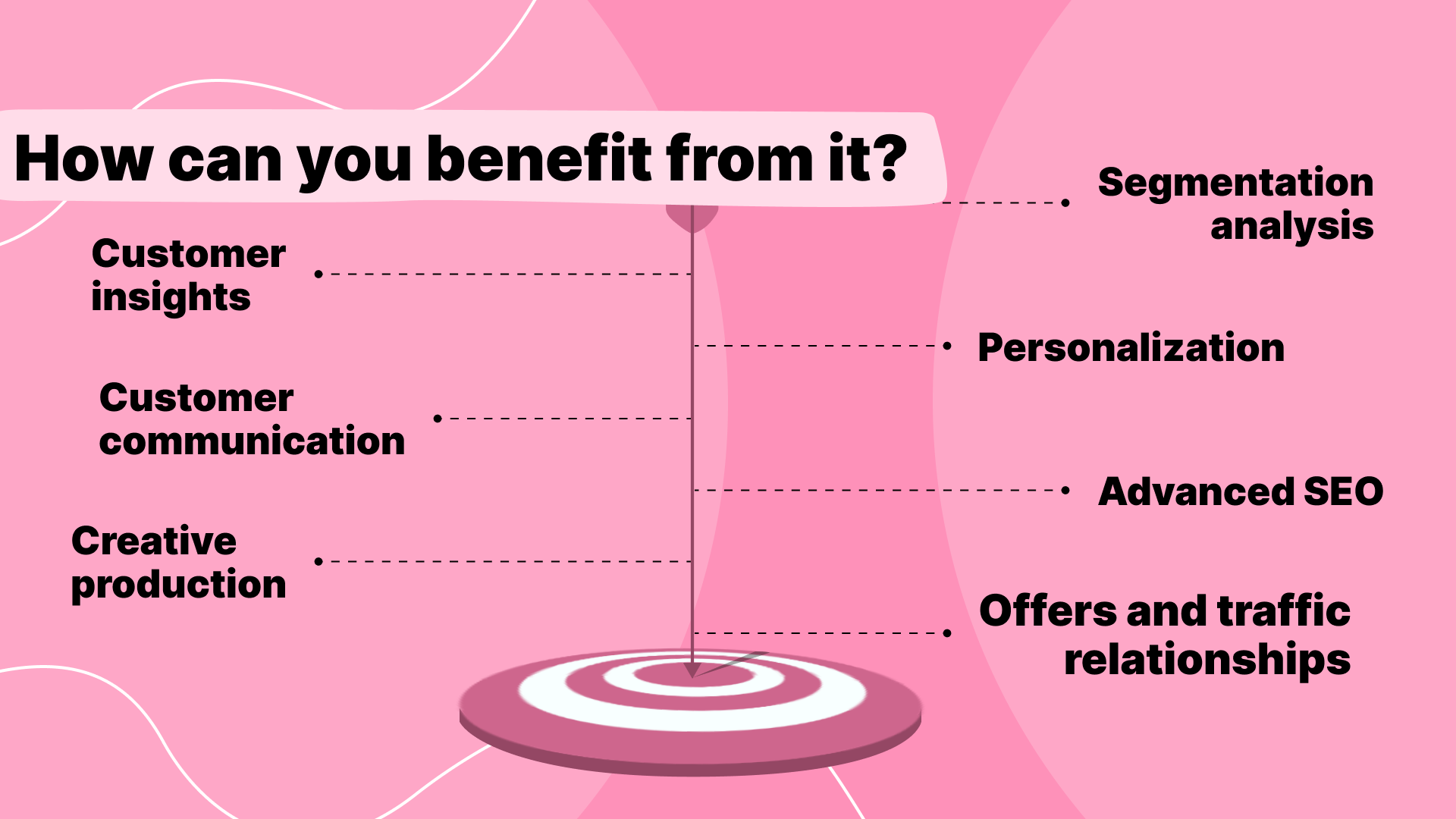
When the excitement and confusion of realizing the greatness of artificial intelligence technology cools down, a logical question arises in the mind — how can an ordinary user: a digital marketer, affiliate, or advertiser use AI capabilities in their work? We have prepared for you some practically applicable AI features that you can start implementing into your marketing strategy and truly optimize your business processes. Harness the potential of the machine!
Customer insights
AI tools dig deep into customer data to uncover insights that might not be visible through traditional analysis. Understanding patterns in customer behaviour, preferences, and purchasing decisions allows affiliates to adjust their strategies in real time, enhancing the effectiveness of their campaigns.
Segmentation analysis
Effective segmentation involves using AI to navigate through and analyse extensive data sets. This will assist marketers to identify and target specific customer segments. Such specific targeting helps affiliates tailor their strategies to the most responsive audiences, increasing conversion rates.
Personalization
AI's ability to personalize is perhaps most visible in how content and offers are tailored to the individual consumer. By leveraging data collected on consumer behaviours and preferences, AI can customize the marketing experience, dramatically boosting conversion rates.
Customer communication
AI-driven chatbots provide instant, round-the-clock customer service for affiliate marketing sites. These bots handle inquiries and guide customers through the purchasing process. As a result, offer a seamless, responsive service that enhances user satisfaction and loyalty.
Advanced SEO
AI improves search engine optimization for affiliate marketers by optimizing keyword strategies and improving content relevance. These tools analyse user interaction and search patterns to tailor content that ranks higher and attracts more traffic, essential for affiliates looking to increase visibility.
Offers and traffic relationships
AI plays a critical role in matching the right ad offers to the right type of traffic. By analysing past performance data and user behaviour, AI systems can predict which offers will perform best on which platforms, maximizing the effectiveness of ad placements.
Creative production
AI's capacity to generate engaging content is invaluable in affiliate marketing. From crafting compelling ad copy to designing personalized banners and videos, AI tools help to generate attractive and relevant affiliate creatives that resonate with the target audience, driving engagement and conversions.
In general, producing creatives is a separate, huge topic. By learning how to effectively use AI technologies to generate photo and video content for campaign requests, you can significantly save your budget for the design part and get a list of other benefits. Read more about how to quickly make engaging creatives with the help of AI services in one of our previous articles.
Where to start with marketing AI?
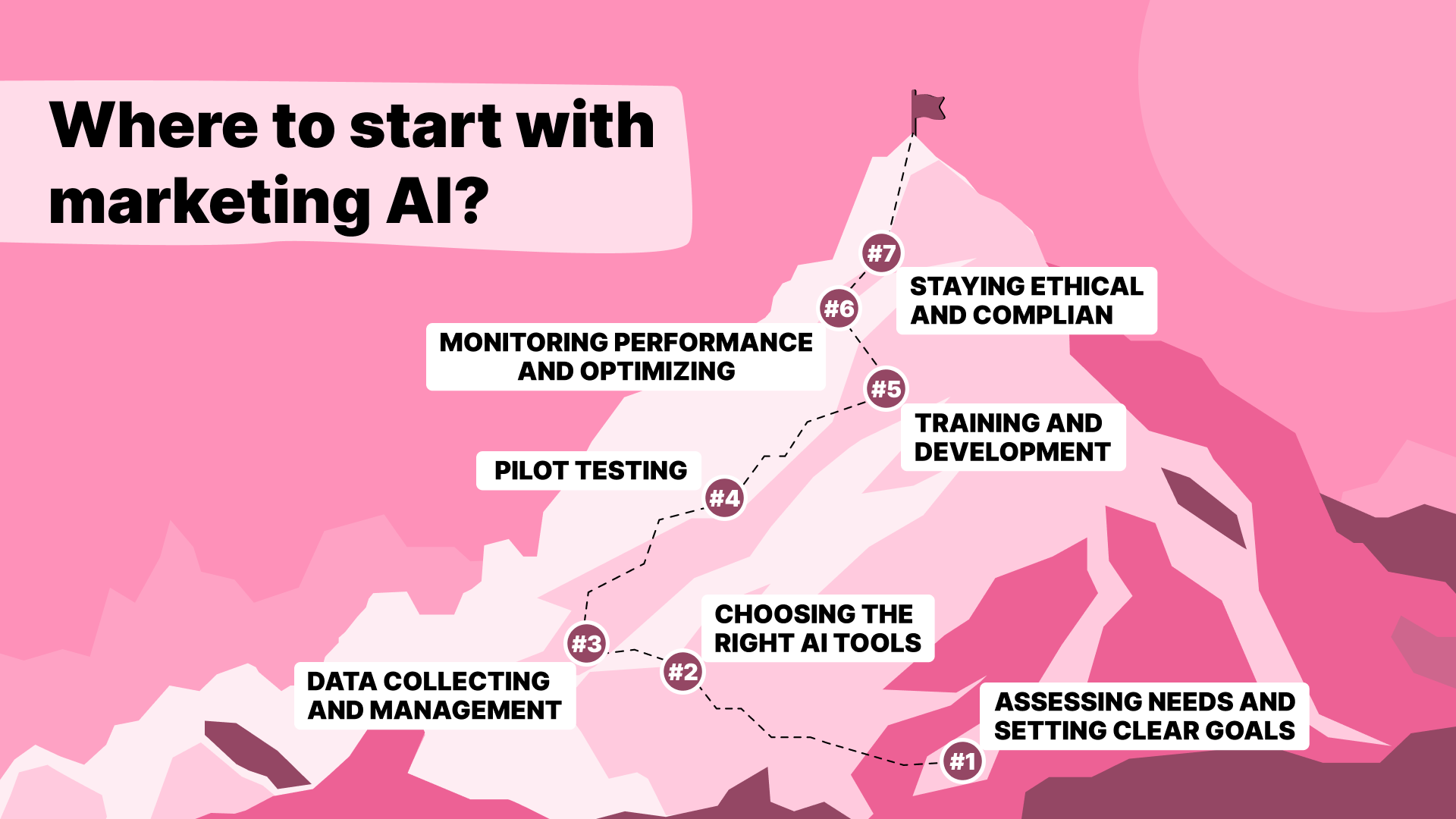
If you've already been sufficiently inspired by the variety of applications of AI technologies, it's time to think about how to practically implement the right technologies into your business strategy. Integrating AI into digital and affiliate marketing campaigns offers a pathway to enhanced efficiency and innovation. Here’s a step-by-step guide to effectively incorporate AI technologies into your marketing efforts.
Assessing needs and setting clear objectives
Begin by identifying the specific challenges and opportunities within your marketing strategy where AI can have the most impact. Whether it's improving customer segmentation, personalization, or campaign analytics, setting clear objectives will guide your AI integration process.
Choosing the right AI tools
Select AI tools that best meet your established goals. Consider various options like AI-driven analytics platforms for data insights, chatbots for customer service, or AI-powered content creation tools for engaging marketing materials. Ensure the tools are compatible with your existing technology stack. We will research some of the most useful AI marketing tools in the following section.
Data collecting and management
AI operates on data, so having a robust system for data collection and management is crucial. Ensure that your data is high-quality, comprehensive, and clean. This will involve setting up efficient data pipelines and possibly training your AI with initial datasets to ensure its effectiveness.
Pilot testing
Before a full rollout, conduct A/B tests with the chosen AI tools. This smaller-scale implementation allows you to measure the impact of AI on your marketing efforts and identify any potential issues in a controlled environment. Use these insights to adjust and optimize AI applications for your needs, or to choose the best tool option for your tasks.
Training and development
Invest in training for your team to make sure they are proficient in using AI tools and interpreting AI-driven insights. Continuous learning and development are vital as AI technology evolves rapidly, and staying updated with the latest advancements can provide your brand with competitive advantage.
Monitoring performance and optimizing
Once fully integrated, continuously monitor the performance of AI tools. Use the insights gained to refine and improve your strategies. Regularly update your AI systems to adapt to new marketing trends and changes in consumer behaviour.
Staying ethical and compliant
As you integrate AI into your marketing, always consider the ethical implications and remain compliant with relevant data protection regulations. Maintain transparency with your customers about how AI is used in your strategies to build trust and loyalty.
AI tools to use for your marketing
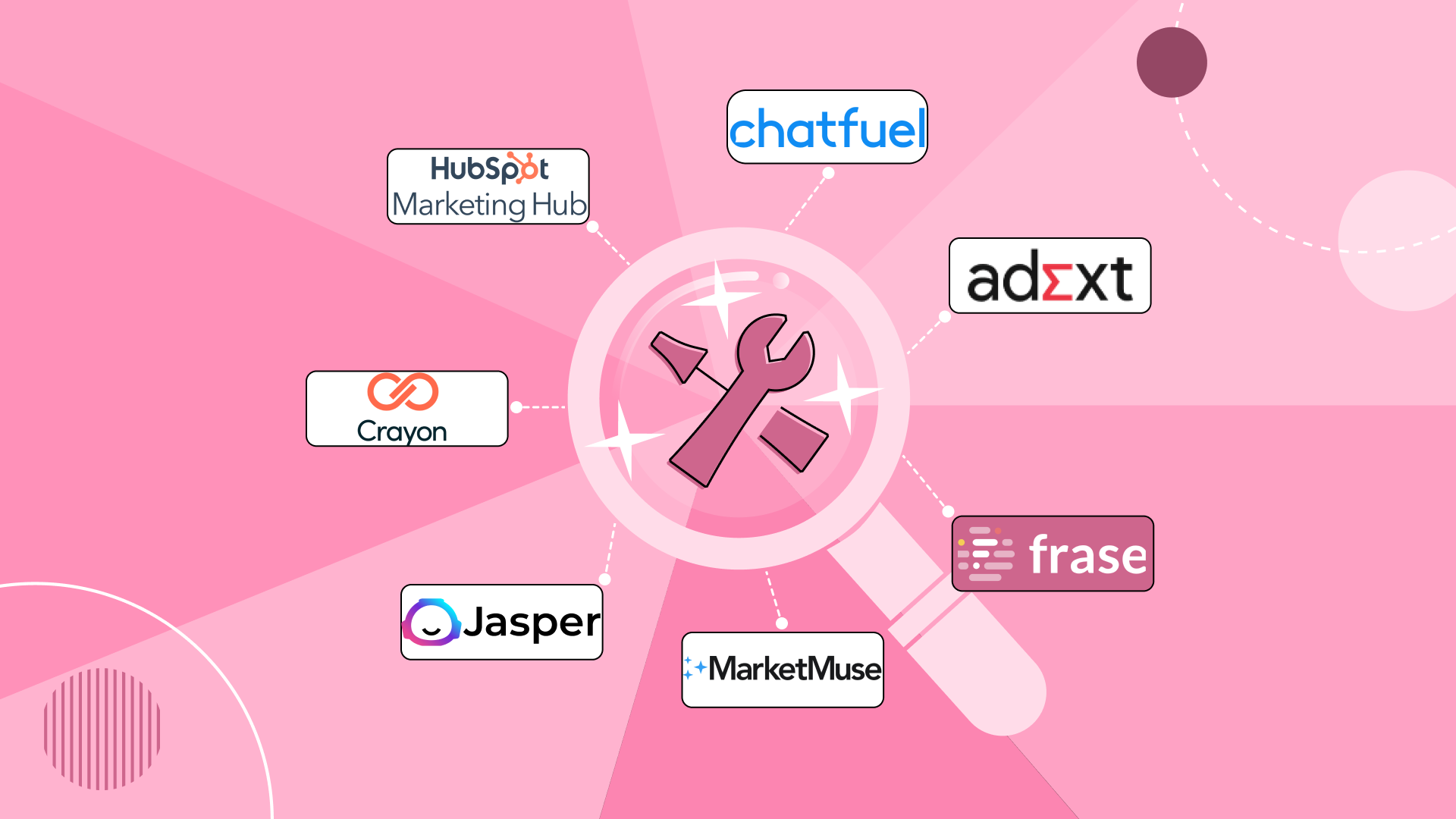
Here are some of the top AI tools that marketers can utilize to strengthen their strategies and achieve better outcomes:
HubSpot Marketing Automation
HubSpot offers a comprehensive marketing platform that includes AI-powered automation tools. These tools help in managing and engaging leads through personalized email workflows and content, making it easier for marketers to convert leads into customers by delivering targeted messages at the right time.
Crayon
Crayon relies on AI to track competitor websites across digital channels, providing insights into competitors’ marketing strategies and performance. This intelligence allows marketers to stay ahead of market trends and adjust their strategies proactively to maintain competitive advantage.
Jasper
Built on state-of-the-art language processing technology, Jasper assists marketers in creating compelling, high-quality content across various formats: blog articles, social media posts, and marketing emails. For affiliate marketers, Jasper streamlines content creation, enabling engaging narratives that drive traffic and conversions, maximizing the effectiveness of marketing campaigns.
MarketMuse
MarketMuse makes use of AI to optimize content for search engines and target audiences by suggesting new features and topics that are missing from existing content. It enhances content quality by ensuring it is more comprehensive and SEO-friendly, which is vital for driving organic traffic.
Frase
By leveraging AI, Frase analyses search trends and top-performing content to help marketers craft highly optimized content tailored to audience interests and questions. This tool is particularly useful for affiliate marketers, as it aids in developing content that aligns with affiliate products, improving SEO, and increasing conversion rates.
Adext
Adext uses AI to automate ad management across various platforms, using algorithms to analyse which demographics are most likely to engage with an ad and adjust bidding and targeting accordingly. This ensures higher conversion rates by optimizing ad spending towards the most responsive audiences.
Chatfuel
Chatfuel provides an easy-to-use platform to build AI-driven chatbots for Facebook Messenger. These chatbots can automate customer service tasks, lead qualification, and even content delivery, allowing brands to interact with customers more effectively and at scale.
In case you would like to come from a different angle and automate not point tasks, but entrust AI with the entire website building, this article with a selection of useful services is definitely for you.
These tools showcase the multifaceted nature of AI in improving various aspects of digital and affiliate marketing, from content creation and SEO to lead management and competitive analysis. By integrating these AI solutions, marketers can significantly improve their strategic executions and operational efficiencies.
Final thoughts
AI technology brings additional opportunities for marketing automation, deeper analytics, and advanced insights to engage audiences and increase conversions. If you're seriously interested in the possibilities of artificial intelligence, there's nothing stopping you now from putting its capabilities to work. Use our guide and a variety of useful AI applications to take your marketing automation to the next level and knock your competitors' socks off.
In case you feel the need for a little more theoretical training, check out the first article in our Marketing AI series.
FAQ: AI marketing implementation
What are the first steps in implementing AI in my marketing strategy?
Begin by identifying specific goals that AI can help you achieve, such as improving customer engagement or increasing sales conversions. Next, choose the right AI tools that align with these goals, and ensure you have the right data infrastructure in place to support AI technologies.
How does AI help in targeting and segmentation?
AI analyses large datasets to identify patterns and trends that humans might miss. This allows for more accurate segmentation of customer bases and more targeted marketing strategies, which can lead to improved campaign performance.
Are there ethical considerations with using AI in marketing?
Yes, these include ensuring data privacy by protecting personal information and being responsive to privacy laws, maintaining transparency about how AI influences decision-making, preventing biases in AI algorithms to ensure fairness, and obtaining permission from consumers before analysing their data.
